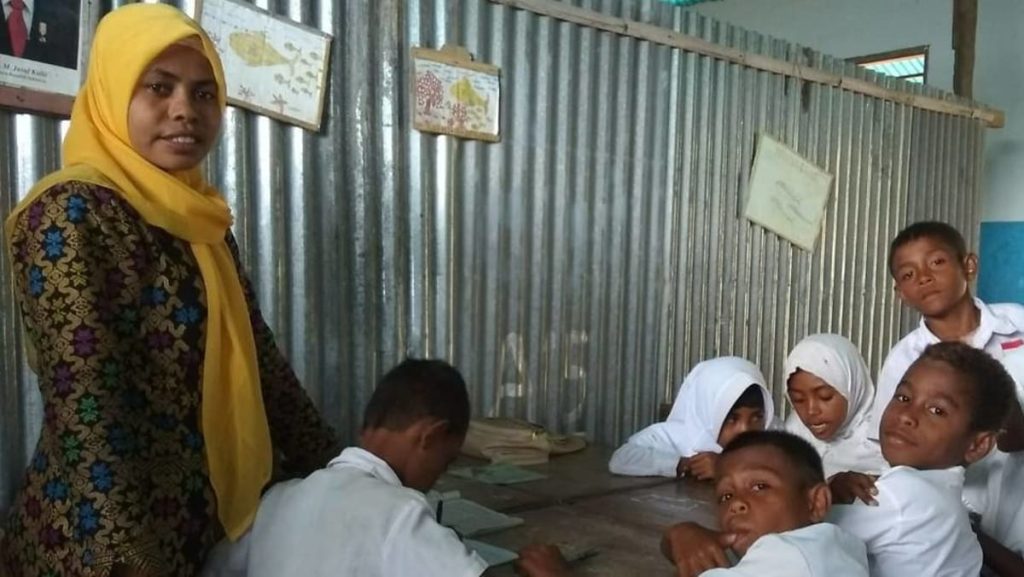Indonesia’s education sector has long grappled with the challenge of adequately compensating its teachers, particularly those holding honorary positions. Rahima’s story exemplifies this predicament. Despite holding a bachelor’s degree in education and dedicating five days a week to teaching at a public elementary school in Alor, her monthly honorarium of 300,000 rupiah (US$18.50) falls drastically short of the provincial minimum wage of 2.3 million rupiah. This disparity forces her to supplement her meager income through additional work, highlighting the financial strain faced by many honorary teachers. This situation reflects a broader issue within the Indonesian education system, where honorary teachers, often shouldering responsibilities similar to full-time teachers, receive significantly lower compensation. The reliance on honorary teachers underscores the need for comprehensive reforms to address the pay gap and ensure fair compensation for all educators.
President Prabowo Subianto’s recent announcement of a significant wage increase for teachers aims to alleviate this long-standing issue. His proposed 100% basic salary increase for state teachers and a 2 million rupiah allowance for part-time teachers in state schools signifies a substantial step towards recognizing the vital role of educators and improving their financial well-being. For honorary teachers like Rahima, this increase could potentially boost their monthly income to 2 million rupiah, a substantial improvement that could significantly impact their livelihoods. The allocation of an additional 16.7 trillion rupiah to the teachers’ welfare budget, bringing the total to 81.6 trillion rupiah (US$5.1 billion) in 2025, underscores the government’s commitment to investing in the education sector and prioritizing the welfare of its teachers. This investment aims to not only enhance the quality of education but also attract and retain qualified individuals in the teaching profession.
Beyond the realm of education, President Prabowo’s commitment to improving workers’ welfare extends to the broader labor market. His announcement of a 6.5% increase in the average national minimum wage for 2025 signals a broader push to address economic disparities and ensure a decent standard of living for all workers. This move deviates from the previous practice of regionally determined minimum wages, establishing a national standard aimed at providing a more equitable baseline for compensation. This standardized approach seeks to address regional disparities in wages and ensure a minimum level of economic security for workers across the country.
The rationale behind this wage increase is rooted in the recognition of the “particular importance” of workers’ welfare and the role of minimum wage as a “very important social safety net” for those with less than 12 months of employment. This emphasis on social safety nets reflects a broader policy focus on protecting vulnerable workers and ensuring their basic needs are met. By guaranteeing a minimum income level, the government aims to mitigate economic hardship and provide a foundation for upward mobility. This approach reflects a growing awareness of the importance of social safety nets in promoting economic stability and reducing inequality.
The dual focus on increasing both teachers’ salaries and the national minimum wage reflects a comprehensive approach to improving the economic well-being of a significant portion of the Indonesian workforce. By investing in both education and the broader labor market, the government aims to create a more equitable and prosperous society. This approach recognizes the interconnectedness of these sectors and the importance of investing in human capital. Improving the financial security of teachers not only benefits them directly but also contributes to the overall quality of education, which in turn benefits the entire nation. Similarly, raising the minimum wage for all workers strengthens the economy by boosting consumer spending and reducing poverty.
This interconnected approach to economic development highlights the government’s commitment to addressing both specific sectoral challenges and broader economic inequalities. By targeting both teachers and the wider workforce, President Prabowo’s policies aim to create a more equitable distribution of wealth and opportunity. This approach recognizes the fundamental role of both education and fair labor practices in driving economic growth and social progress. The increased investment in teachers’ salaries and the standardization of the minimum wage represent significant steps towards building a more inclusive and prosperous Indonesia. The long-term success of these policies will depend on effective implementation and ongoing monitoring to ensure they achieve their intended goals.

